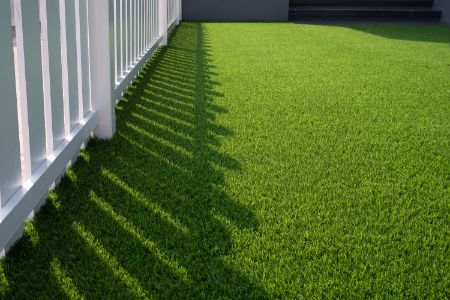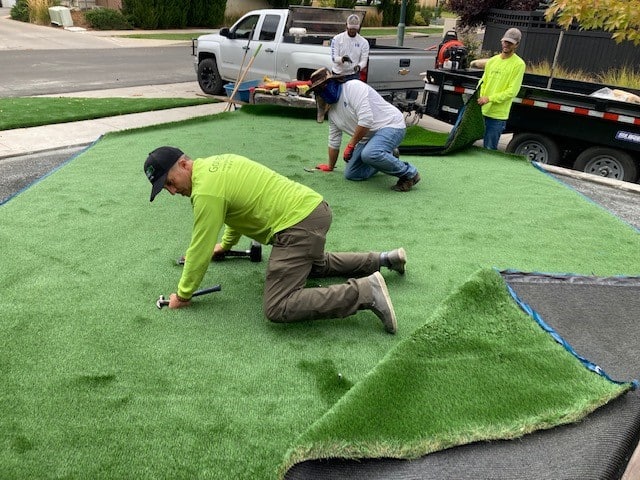Discover the Conveniences of Artificial Yard for Effortless Grass Care and Sustainability
With a focus on water conservation, very little maintenance demands, and environmentally friendly qualities, artificial yard supplies an engaging option to standard turf. What really sets artificial yard apart in terms of easy lawn treatment and sustainability?

Water Preservation Advantages
Synthetic grass uses significant water conservation benefits, especially in regions where water deficiency is a problem. Natural lawn yards call for significant quantities of water to keep their lavish look. In comparison, man-made turf removes the need for routine watering, saving an approximated 55 gallons of water per square foot every year. This decrease in water use not just adds to decrease water bills for property owners however additionally assists alleviate the pressure on neighborhood water sources, making fabricated turf a lasting landscaping option.
In addition, the conservation of water via synthetic lawn extends past household applications. Parks, sports fields, and industrial homes can additionally take advantage of the lowered water needs of artificial grass. In regions affected by dry spell or dealing with water constraints, the setup of man-made yard can play an important duty in making sure outside areas remain eco-friendly and functional while promoting responsible water use methods.
Reduced Upkeep Requirements
Offered the considerable water conservation advantages highlighted in the previous subtopic, it appears that synthetic lawn additionally stands out in requiring very little maintenance. Unlike natural yard, synthetic grass does not require watering, mowing, feeding, or pesticides to keep its lavish look. This translates to substantial time and price savings for home owners and organizations alike.
Artificial grass is made to withstand differing climate condition, making it extremely sturdy and durable. It does not need to be sprinkled frequently to remain eco-friendly, getting rid of the requirement for irrigation systems and decreasing water usage. In addition, fabricated lawn does not grow, so there is no need for trimming or edging, saving both effort and time.
Any debris that falls on fabricated turf can be easily eliminated with a leaf blower or a light rinse with water. In general, the minimal maintenance needs of synthetic turf make it a useful and sustainable choice for landscape design requirements.
Eco-Friendly Attributes

Additionally, synthetic yard is normally made from recycled products, further promoting eco-friendliness by reducing waste and the requirement for new raw products. In general, the environment-friendly nature of fabricated lawn aligns with lasting methods, making it a practical alternative for ecologically aware individuals looking to lower their eco-friendly influence. artificial grass mesa az.
Enhanced Durability and Long Life
The toughness and long life of fabricated grass go beyond typical yard options, making certain long-term top quality and efficiency in various environmental problems. Unlike all-natural turf that needs routine maintenance such as mowing, watering, and fertilizing to remain healthy, fabricated grass preserves its rich you could look here appearance year-round with marginal upkeep.
Furthermore, artificial yard is designed to resist pests, mold, and mildew, further improving its longevity. The materials utilized in manufacturing artificial turf are often UV-stabilized to stop discoloration and degradation triggered by sun direct exposure, ensuring that it stays lively and green for many years to find. By investing in man-made yard, home proprietors can appreciate a low-maintenance, resilient option to natural my link turf that enhances the visual appeal of their exterior areas.

Health And Wellness Advantages
Preserving synthetic yard supplies homeowner a host of health and safety advantages, making it a sensible choice for creating a safe and clean outdoor setting. Unlike all-natural turf that calls for chemicals, herbicides, and plant foods for maintenance, artificial lawn eliminates the demand for these chemicals, minimizing the threat of exposure to dangerous compounds for both people and pets. Additionally, artificial turf gives an uniform and degree surface area that can aid stop trips, slides, and drops, particularly in locations where natural yard might end up being irregular or create holes. This attribute is particularly valuable for children and senior people that are a lot more prone to accidents in exterior rooms.
Additionally, man-made grass does not attract insects like ticks and fleas, which are usual in all-natural lawn yards, reducing the opportunities of insect attacks and invasions. The lack of mud and puddles on artificial lawn also lessens the threat of sliding and injuries throughout damp weather. Overall, the health and wellness and security benefits of man-made yard add to a worry-free and protected exterior setting for families, animals, and site visitors alike.
Verdict
Finally, the advantages of synthetic grass appear in its water conservation benefits, low maintenance needs, environment-friendly functions, boosted resilience, and health and wellness advantages. Artificial yard offers a lasting solution for effortless grass treatment, making it a practical selection for homeowners and organizations wanting to lower water this website use and ecological effect. turf installation mesa az. Its durable buildings offer an affordable and low-maintenance option to typical grass yards